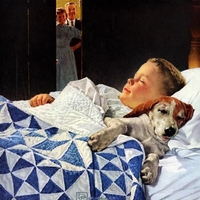Should We Let Sleeping Dogs Lie… With Us?
Synthesizing the Literature and Setting the Agenda for Research on Human-animal Co-sleeping Practices
DOI:
https://doi.org/10.52537/humanimalia.9930Abstract
Humans and animals share their lives with one another in many ways. Pets, for example, are often considered valuable members of the family. They are invited into human hearts and homes, where they share routines, food and space. Animals are not only important to human waking lives. Some of them also share human beds – be it by invitation or invasion! Yet, little is known about human-animal co-sleeping practices and their impact on humans, animals and human-animal relations. This is the first paper to critically collate the scant and disparate research on human-animal co-sleeping. Given that the research is risk-centric, the paper turns to established theories on animal attachment to propose explanations for the continued practice of human-animal co-sleeping and its benefits. To redress an anthropocentric bias in the limited existing research, an agenda for further research is outlined on human-animal co-sleeping that considers humans, animals and the human-animal relation.
Downloads

Published
Issue
Section
License

This work is licensed under a Creative Commons Attribution-NonCommercial 4.0 International License.









